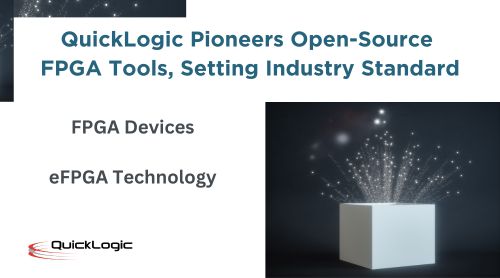In 2020, QuickLogic became the first programmable logic company to embrace open-source FPGA User Tools as our preferred and supported offering for our customers. The company’s QORC (QuickLogic Open Reconfigurable Computing) initiative made it possible for developers to use open-source tools to design and build products with QuickLogic’s FPGA devices and eFPGA technology.
Our decision to embrace open source was a major step forward for the FPGA industry, validating the years of investment made by the multitude of developers, researchers, universities, and companies into the technology. Open-source tools offer a number of advantages over proprietary tools, including:
Flexibility: Open-source tools are more flexible and customizable than proprietary tools, especially given the growing number of users/developers in the community. This in turn gives FPGA developers more control over the design process.
Accessibility: Open-source tools are available to everyone.
Longevity: For systems with FPGAs or eFPGA-enabled SoCs that need to be updated years or decades into the future, open-source FPGA user tools ensure that engineers can update bitstreams for the entire product lifecycle.
Community: Open-source tools have a large and active community of users and developers, which provides support and resources for those who need assistance.
QuickLogic’s decision to be the first in the industry to embrace open source was a major validation of the open-source FPGA ecosystem. Other vendors are now following suit and embracing its use. This shows that the open-source FPGA ecosystem is maturing and that it is a viable option for developers creating real-world products. As more vendors embrace these tools, more users will too. In addition, the tools will evolve more rapidly, and the ecosystem will continue to gain momentum and add value in a virtuous cycle. We believe that the users are the major beneficiary, and it is likely that they will demand these tools as the de facto standard, and the remaining FPGA vendors will ultimately support them.
We at QuickLogic are thrilled to see this transition beginning to take place, especially given our early leadership position on open-source tooling. The genie has been let out of the bottle and there will be no stopping it now. Going forward, we know that the advantages of open-source tools will make it easier, quicker, and more efficient for developers to use FPGAs and eFPGA IP in their designs – including the broad product offering available from QuickLogic.

